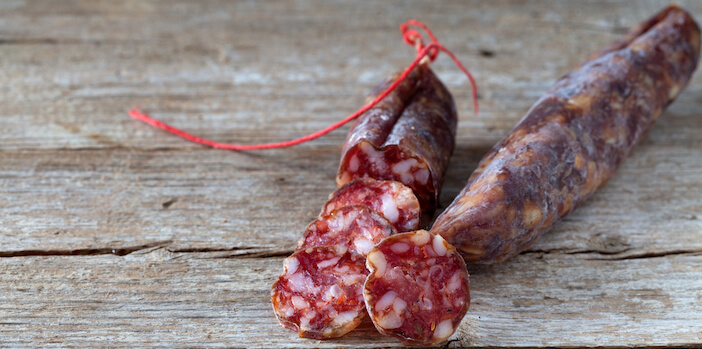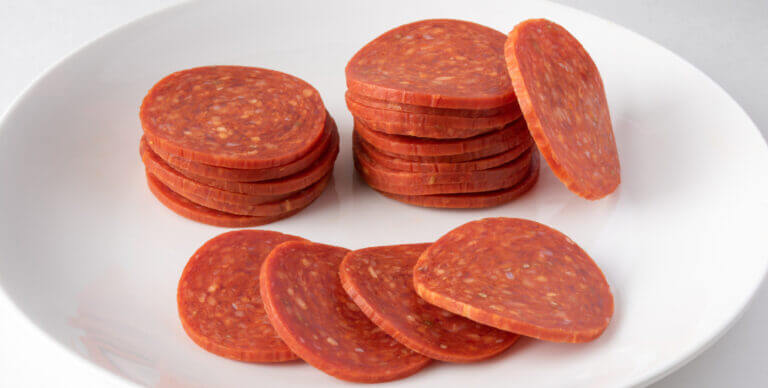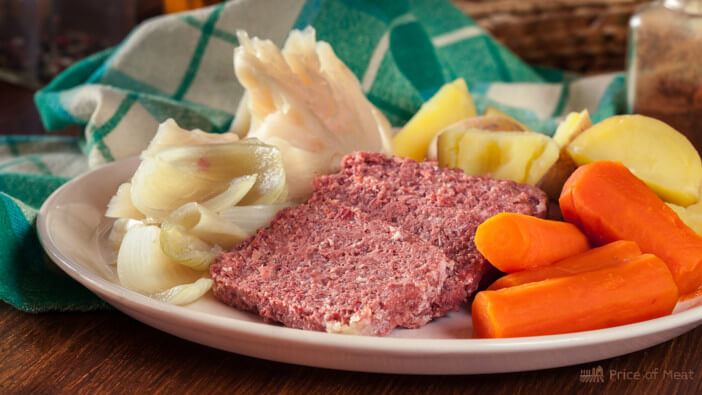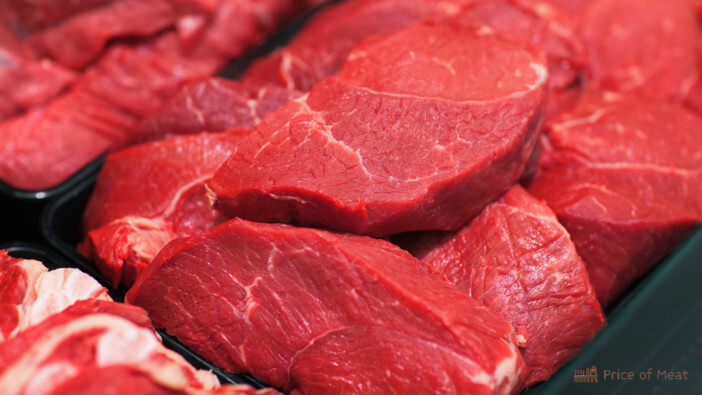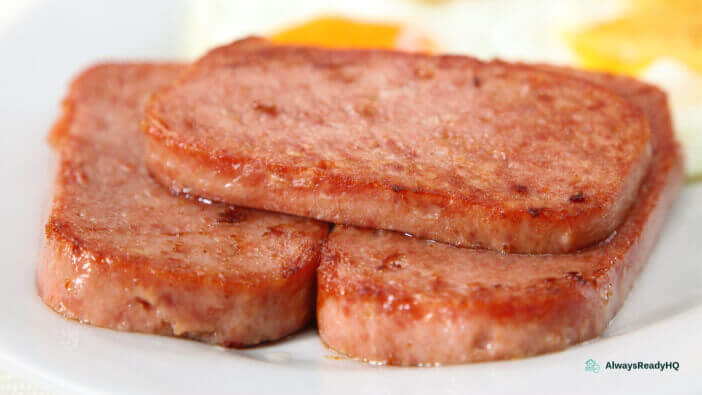5 Reasons Why Bacon Is Salty: Tips to Reduce Saltiness
Bacon is salty due to curing, packaging, and sodium content, but soaking before cooking helps reduce saltiness for a better dining experience.
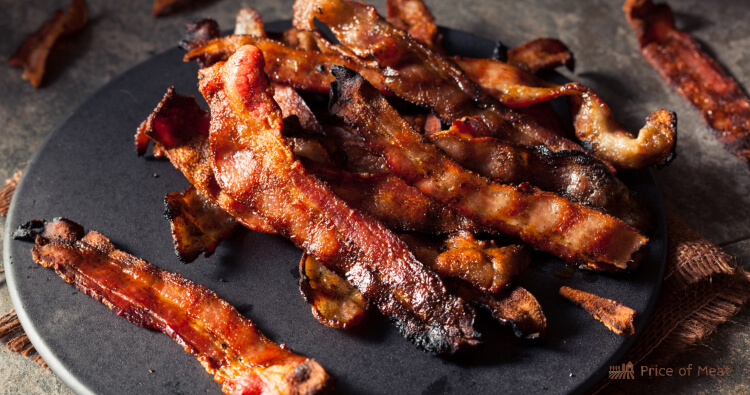
Bacon too salty? Whether you are working with your own slab bacon and prague powder or buying pre-cooked & flavored bacon, your bacon is likely too salty due to modern packaging and shipping. You can fix the saltiness by soaking before cooking. Now, there is a bit more nuance to the whole story that starts with what bacon is & how it’s shipped to our homes.
Disclosure: As an Amazon Associate, this site earns from qualifying purchases. Thank you!
What Precisely Is Bacon?
You can conjure an image of bacon in your mind without any trouble in all likelihood when you hear the word, but you might want to know a bit more about what it really is from a definitional standpoint. The US Department of Agriculture and Food Safety (USDA) provides an excellent definition of what bacon is:
The term bacon is used to describe the cured belly of a swine (hog) carcass. If meat from other portions of the carcass is used, the product name must identify the portions where the bacon comes from, e.g., “Pork Shoulder Bacon.” Bacon is generally produced from young animals (6 to 7 months old) that weigh between 175 to 240 pounds.
This is a very scientific way of looking at a food that the vast majority of people reading this grew up with and are familiar with. However, it is nice to know specifically what something is when talking about it in great detail.
Your memories of bacon probably fall more along the lines of how the bacon crackled and tasted when it hit your tongue. The chewiness or the crunchiness (depending on how it was prepared) is something that can bring back some incredible memories from earlier times.
This is why many of us love bacon, and plenty of people eat it every morning or nearly every morning as part of their breakfast routine.
Why Is Bacon So Salty?
Bacon is always cured in a salt solution to help bring out its flavors for the end consumer. This is great in the sense that it means that the consumer gets to bite into something delicious tasting, but it doesn’t always serve them well when they are trying to watch how much sodium they take in their diet.
When that is the primary concern, the salty content of bacon gets a harder look from many people.
Packaging Plays A Factor
Bacon is such a popular breakfast staple that it is available in nearly every grocery store across the country. The stores feel that they need to keep it stocked up because they know how much their customers love it, and they don’t want to disappoint them.
Thus, they tend to keep more than enough of this breakfast food available in the store at all times. That is terrific news for people who love bacon, but it also means that the industry has to figure out a way to package the bacon and keep it fresh long enough for it to hit store shelves. This tends to mean packaging it in a way that seals in freshness.
The best way to do that for most foods is to up the sodium content. Salt locks in the freshness of those foods, but it also adds to the overall sodium and salty flavor in the food.
his is not great from a health perspective because people need to make sure they keep their sodium levels in check as much as possible to avoid the impacts that it can have on their blood pressure levels, heart health, and more.
It is important to always check the sodium content of any food before consumption, and it may be particularly useful when considering eating bacon on a regular basis.
Does It Really Need To Be This Salty?

One of the frustrating things for those trying to watch their sodium is the fact that bacon doesn’t really need to be as salty as it turns out to be. It was highly useful to have maintenance techniques for maintaining freshness in the past, but now that refrigerators are a very common household appliance, it is hardly necessary anymore.
Thus, many customers who purchase bacon are buying a product that has higher levels of salt in it than what is truly necessary to keep it fresh.
What Can You Do To Combat The Sodium Of Bacon?
There are some alternatives that you can purchase to bacon that have less salt but may stand in as a good substitute such as:
- Turkey bacon
- Lower sodium versions of regular bacon (check the labels)
- Tofu or Tempeh Bacon
- Duck bacon
- Mushroom bacon
- Candy bacon
If you hadn’t heard of some of these before, don’t worry. Many people are just now hearing about some of the great alternatives to traditional bacon that exist out there.
They are finally getting a chance to continue to have a bacon-like food at their table for breakfast every morning without the health downsides that frequently come with regular bacon.
This is a great message to get out to people who simply cannot imagine what the world would be like without their delightful bacon as an option for them all the time.
How Will You Know If Bacon Is Too Salty?
The first thing that you can do is look at the nutritional label on the bacon to see how much sodium is in it. You should get some idea right then and there about how salty the bacon you are about to cook is. However, you can also do a simple taste test once you have had the chance to cook the bacon yourself.
The only way to truly know if the bacon you are eating now is really too salty or not is to compare it to bacon that you cure on your own. That takes a lot of work of course, but you will experience the difference between the two right away.
If you can make bacon at your own home that tastes just as good or better than the kind you buy in the store, why wouldn’t you sit down and make that happen right now? You could save yourself from the excess sodium while still producing something that tastes amazing.
If you don’t have the capacity to do it all on your own, then you can at least consider purchasing some from a local farmer’s market or through another local connection, you know it will be fresh because it is locally sourced, and you will be helping to give back to your community at the same time. That is a win-win for everyone.
FAQs About Salty Bacon
Here are a few FAQs about Salty Bacon.
Why does my bacon taste salty?
Bacon is naturally salty because it is made from pork. The salt is used to preserve the meat and add flavor. Modern packaging techniques also add salt to the bacon. Cooking your bacon at a high temperature will also make it taste salty.
Does bacon get saltier as you cook it?
Bacon gets saltier as you cook it, because the bacon itself releases enough fat to bring out the flavors. Rinse and pat dry your bacon (to eliminate excess flavor-blocking moisture) before cooking it, so that there’s a better ratio of fat to salt on your slices.
Does rinsing bacon reduce sodium?
Rinsing can reduce some sodium, but it’s more effective to let the bacon soak.
Is bacon salted?
Yes, bacon is salted. Salt is added to almost all commercially produced bacon in the U.S., which makes for a more flavorful and easier way of eating it without having to endure the strong taste from just the meat alone.
Why is uncured bacon so salty?
Uncured bacon is so salty because it doesn’t have the same curing process as cured bacon. Curing is a process where sodium nitrite is added to the meat to preserve it and give it a pink color. Without this curing process, uncured bacon is more likely to spoil and will be saltier in taste.
How do you get salt out of bacon?
Simply soak the bacon in plain water. Let sit for 30-60 minutes (more time for larger pieces), then remove and fry up a little sample piece. It’s still too salty? Replace the water one more time and try again until you get it.
Can you eat bacon on a low sodium diet?
Bacon can be eaten on a low sodium diet; however, there’s always the risk of adding too much salt to your food during cooking.
How do you make bacon not salty?
To make bacon less salty, you can follow these steps: Start by boiling water and pouring it over the bacon until it is completely covered. Gently stir the bacon and let it sit for 2 minutes. Next, rinse and drain the bacon, and repeat the process by boiling more water and submerging the bacon for 1 minute. Once done, rinse, drain, and pat the bacon dry before cooking.
Does washing bacon remove salt?
Washing bacon does not remove salt. To make bacon healthier, you can soak it in water and rinse it in hot water to reduce some of the salt content. Additionally, removing the rind can help decrease the amount of saturated fat. If you prefer to have condiments like ketchup, mustard, or brown sauce with your bacon, it is advisable to check the labels and opt for lower salt options, as these can contribute to hidden salt intake.
Can bacon be cured without salt?
Bacon can be cured without salt, but it is a matter of personal preference. Some people choose to add curing salt to provide additional protection against botulism, while others opt not to use it due to concerns about nitrites converting into nitrosamines at high cooking temperatures.
What salt is used in bacon?
The salt used in bacon is pink salt, also known as curing salt No. 1. It is a combination of sodium chloride, or table salt, and nitrite, a preserving agent used to prevent bacterial growth in cured meats. Bacon is cured in the refrigerator, then slow roasted, and finally cooked again before serving.
How do you remove salt from meat?
To remove salt from meat, you can start by patting the surface with a damp paper towel. This will help to absorb some of the salt granules. If the salt is present on a piece of meat, you can either rinse it under running water or let it soak in water for an hour, allowing the salt to dissolve into the water.
Why is bacon so good?
Bacon is incredibly delicious due to the breakdown of its fat during cooking, resulting in the formation of delightful taste compounds that are both sweet, buttery, and salty. This unique combination of flavors adds an irresistible touch to beloved dishes like french fries or hamburgers, creating a sensory overload that is simply irresistible. Once again, it is the wonders of chemistry that contribute to the mouthwatering appeal of bacon.
Does bacon salt taste like bacon?
Bacon salt does indeed taste like bacon, providing the savory and smoky flavor that bacon lovers crave. The unique aspect of bacon salt is that it offers the taste of bacon without the added calories, fat, or guilt, making it a suitable option for vegetarians who miss the deliciousness of bacon. Additionally, bacon salt is a vegetarian and kosher seasoning, ensuring that it can be enjoyed by a wide range of individuals.
Is smoked bacon less salty?
Smoked bacon does not have a lower salt content, but it does enhance its flavor and slightly prolong its shelf-life. Additionally, the smoking process partially cures the meat, resulting in improved taste and texture. However, it is important to note that consuming raw bacon is not advisable as it increases the likelihood of bacterial infections.
Why is my bacon full of water?
Your bacon is full of water because it is intentionally added to increase profits and save time during the production process. Whether wet- or dry-cured, making bacon properly is a time-consuming task.
What kind of fat is in bacon?
The fat in bacon consists mainly of monounsaturated fat, specifically oleic acid, which makes up around 50% of the fat content. Additionally, approximately 40% of the fat in bacon is saturated, while the remaining 10% is polyunsaturated.
Why is there so much sodium in bacon?
There is a significant amount of sodium in bacon due to the curing process, which involves the use of salt. The high salt content in bacon has been linked to a higher likelihood of developing stomach cancer (9). Additionally, individuals with salt sensitivity may experience elevated blood pressure as a result of excessive salt consumption (10).
Why is bacon the most unhealthy food?
Bacon is considered the most unhealthy food due to its high fat content, with approximately 68% of its calories coming from fat. Out of this fat content, about half is saturated fat, making it a less healthy meat option. Additionally, bacon and other processed meats are often treated with nitrates or nitrites, which are chemicals used for preservation and color enhancement.
Are there any benefits to eating bacon?
There are several benefits to eating bacon. Bacon contains choline, which is essential for maintaining healthy brain function and memory. Additionally, the B vitamins in bacon aid in converting food into energy, thus boosting energy levels. Moreover, the amino acids present in bacon can help regulate mood and reduce stress, thereby improving overall mood.
Is crispy bacon healthier?
Crispy bacon can be healthier depending on how it is cooked. The recommended method for cooking bacon to maximize its health benefits is to cook it until it becomes crispy, but not burnt. This cooking technique allows the excess fat to melt off, resulting in a healthier option. Additionally, draining the cooked bacon on a paper towel or brown paper bag further reduces the fat content before consumption.
Is bacon bad for your blood pressure?
Bacon’s high sodium content due to its curing process can have negative effects on blood pressure, potentially increasing the risk of heart disease and hypertension.
Is bacon fat healthier than butter?
Bacon fat is lower in saturated fat and higher in monounsaturated and polyunsaturated fats compared to butter, making it a potentially healthier option.
Why is pork naturally salty?
Pork is not naturally salty. The perception that pork is salty is a myth. The saltiness in pork products is a result of the processing and curing methods used, where salt is added. However, fresh cuts of pork are naturally low in sodium. In fact, fresh New Zealand pork can be included in a low sodium diet.
How bad is sodium nitrate in bacon?
Sodium nitrate in bacon is considered harmful due to its association with heart disease and diabetes. This preservative, along with its similar additive sodium nitrite, is commonly used in cured meat products like deli meat and jerky. Concerns about its negative health effects have led to the removal of this additive from certain food items.
Is bacon good for losing belly fat?
Bacon can be beneficial for losing belly fat as it is a zero carb food and is commonly included in diets like Atkins, Paleo, and Keto. Studies have shown that reducing carbohydrate intake can lead to increased calorie burning. Therefore, incorporating a bacon breakfast into your weight loss or maintenance plan can be advantageous.
Is there unsalted bacon?
There is unsalted bacon available in the market, but it is quite rare to find. Hilltop’s bacon stands out as a unique option since it is made from pastured, chemical-free pork, and is uncured, unsalted, nitrate-free, and does not contain any sugar. It is difficult to find any other bacon on the market that does not include sugar.
What is the healthiest bacon to eat?
The healthiest bacon to eat is nitrate-free turkey bacon. Brands like Applegate Farms’ uncured turkey bacon are a good choice as they do not contain added nitrates. Additionally, turkey bacon is leaner, higher in protein, and has slightly lower sodium content compared to traditional bacon.
Is all bacon cured with salt?
All bacon is cured with either smoke or salt, meaning there is no bacon that is not preserved.
Can you eat bacon raw?
It is not safe to eat raw bacon. Raw bacon, despite being preserved through the curing process, has not undergone cooking. Similar to other raw foods that should not be consumed, the consumption of raw or undercooked meat can expose you to the risk of foodborne illnesses caused by viruses, bacteria, or parasites.
Is bacon saltier than ham?
Bacon is not as salty as ham, as it contains approximately one-third of the sodium per serving. However, it is still a fatty meat and should be consumed in moderation for the benefit of both your intestines and heart health.
Is uncured bacon less salty?
Uncured bacon is not necessarily less salty. While cured bacon uses artificial nitrates, uncured bacon relies on natural nitrates. However, it is important to note that uncured bacon can actually be saltier than cured bacon. This is because during the curing process, the pork belly in uncured bacon sits in salt brine for a longer period of time, as artificial nitrates cure the pork belly faster.
Why doesn’t bacon taste like it used to?
Bacon doesn’t taste like it used to due to changes in curing methods, as the evolution of the process has introduced the use of nitrates and nitrites in some modern methods. These additives can impact the flavor and texture of the bacon.
What tastes like bacon but isn’t?
Seitan is a food made from wheat gluten, which is transformed into a dough by kneading and boiling. When cooked with smoky seasonings, it closely resembles the taste of bacon.
Is bacon considered a Processed Meat?
Bacon is indeed classified as a processed meat due to its preservation methods, such as smoking, salting, and curing, as well as the addition of chemical preservatives. Processed meats, including deli meats, hot dogs, and bacon, have been linked to an increased risk of cancer. Regrettably, the preservation process of these meats can lead to the formation of cancer-causing substances.
Why does bacon not taste like pork?
Bacon does not taste like pork because it undergoes curing with salt, which gives it a salty flavor even when fried without additional salt. Additionally, smoked bacon often has additional smoky flavors imparted from the wood.
Are nitrates bad for you?
Nitrates are not inherently harmful to you. They are naturally occurring molecules found in vegetables, and consuming vegetables that are rich in nitrates can actually be beneficial for your body. However, it is important to note that when nitrates are used as preservatives in processed meats and exposed to high heat, they can transform into nitrosamines, which can be harmful to your body.
Does bacon have salt added?
Bacon is a preserved pork product that typically comes from the fatty belly of a pig. It is commonly cured in a brine or dry-packed with salt and spices before being smoked. Due to its high sodium content, bacon should be used primarily as a flavor enhancer.
What makes bacon unhealthy?
Bacon is considered unhealthy due to the presence of two preservatives, nitrates and nitrites, which have the potential to form cancer-causing compounds. Consuming processed meat, including bacon, not only raises the chances of developing colon and stomach cancer but also increases the risk of prostate cancer, pancreatic cancer, and mortality from various forms of cancer.
Is bacon bad for high blood pressure?
Bacon’s high sodium content can negatively affect blood pressure, potentially increasing the risk of heart disease and hypertension due to its consumption.
Is there any healthy bacon?
There is healthy bacon available, such as nitrate-free turkey bacon. Brands like Applegate Farms’ uncured turkey bacon are a good option as they do not contain added nitrates. This type of bacon is also leaner, higher in protein, and has slightly lower sodium content.
What bacon has the most sodium?
The bacon with the highest sodium content is turkey bacon, which can actually contain more sodium than pork bacon, depending on the brand. This can pose a greater risk to heart health as people often consume extra servings, mistakenly believing it to be a healthier choice. Similar to pork bacon, most turkey bacon exceeds the WHO sodium benchmark by almost twice the recommended amount.
Is uncured bacon more salty?
Uncured bacon, which uses natural nitrates instead of artificial ones, can actually be saltier than cured bacon. This is because during the curing process, the pork belly in uncured bacon sits in salt brine for a longer period of time compared to cured bacon, which is cured faster with the help of artificial nitrates.




